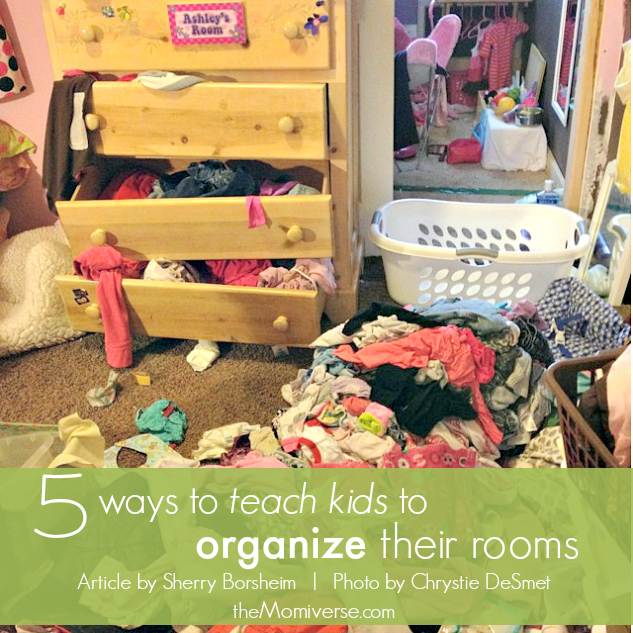
When your kids keep their rooms organized, it teaches them about teamwork, responsibility, contribution, organization, and making your home run more smoothly. These chores also teach your kids the importance of starting and completing a task and offer a feeling of accomplishment on a job well done.
If organization doesn’t come naturally to you, you can learn together with your children to create order and eliminate chaos at home.
I’ve organized many children’s rooms over the years. It’s been my experience that kids love organization and enjoy helping you. Build your child’s confidence by getting him involved in the
process.
Ages 5 and under
I involve kids as young as two years old. At this age, kids can put clothes they’ve outgrown into the donation bag. Give children items to carry when you’re putting items away.
By age three kids really want to help. Children can easily pull items out of a closet and group similar items together. Delegate tasks to keep them busy and involved in the process. I also ask children for help with my label maker by pointing to the letter and spelling out the word. Kids love this tool and enjoy printing labels.
Around the age of four, children know what toys they like to play with and what they don’t use anymore. If they have too many toys, put some away in the closet for rotation. These toys will be like new when you bring them out again three months later.
Ask for help in carrying and putting items away. Children can also assist in organizing their toys, books and clothes. I could get it done faster on my own, but the skills they learn are so important and the fun times we have together are priceless.
Ages 6 and older
When your child is around the age of six ask your child where he likes to play with his toys. Help him contain and label their organizing systems.
Between the ages of eight and eleven, kids tend to have fewer toys, more electronic devices, and more homework. Set up a homework area and help your children organize their papers and school work.
If your children are teenagers, help them organize their rooms based on their interests, activities, and study habits.
Here are five ways to teach your kids about organization:
1. Be a role model.
Children pick up your habits and behaviors. Don’t just tell them to do something, show them how to organize their toys and books, where to put dirty laundry, how to make their bed, and where to put their clothes. Make sure you do the same.
2. Establish routines.
Establish a morning and evening routine. Use a checklist and chore chart to remind children about their responsibilities – putting toys and clothes away, hanging up their coat and back pack, and putting shoes away when they come home from school. Responsibilities will change as they get older.
Schedule four clean-out days each year to help them declutter and organize. Good times to do this are before school starts in September, after Christmas, after birthdays, and at the end of the school year in June. When children learn to keep rooms organized it also teaches them about consumption and immediate gratification. These lessons will be valuable through college and into their careers.
3. Teach children the value of helping others.
Help your children select a charity they’d like to support. Help them understand when they declutter their rooms, their good quality used toys, books and clothes will benefit others. Take them with you when you drop off the items to a family in need or the charity of their choosing.
4. Find what you need when you need it.
Just like adults, kids get frustrated when they can’t find what they are looking for. Help them create zones in their bedroom by grouping like things together. Create a homework zone with their school supplies, schedule, and a place for books. Create a reading zone by their bed. Contain their toys and games and label shelves and containers so they know where to put items.
5. Develop planning skills.
Kids love to display their artwork, awards, photos and things that inspire. Hang a magnetic white board in their room to display items along with their school and extracurricular activities schedule. Teach your kids to prepare, plan and schedule their own activities. Planning skills are essential to effectively manage time for studying and completing homework and assignments. As they grow older, show your children how to use a paper or digital calendar like Google Calendar and sync it to their mobile devices.
Build in a fun reward at the end of each organizing day to celebrate your child’s accomplishments.
Don’t assume your kids will learn on their own to be organized. Organization is a learnable skill and there’s no one-size-fits-all solution to getting organized. Implement what works for you and your family. Don’t leave this to chance or put it off. Organization is a skill your children (and you) will utilize throughout life.
Photo source: Chrystie DeSmet
This Week's Articles Read, learn, live
-
 Summertime grilled vegetables
Summertime grilled vegetables
-
 5 Ways to make this summer full of unforgettable family fun
5 Ways to make this summer full of unforgettable family fun
-
 10 Reasons to take a family vacation in Puerto Vallarta
10 Reasons to take a family vacation in Puerto Vallarta
-
 5 Fun tips for spring cleaning with kids
5 Fun tips for spring cleaning with kids
-
 10 chick flicks with New Year’s Eve scenes
10 chick flicks with New Year’s Eve scenes
-
 The day after Christmas: 5 ways to handle the biggest downer of the year
The day after Christmas: 5 ways to handle the biggest downer of the year
{ 2 trackbacks }